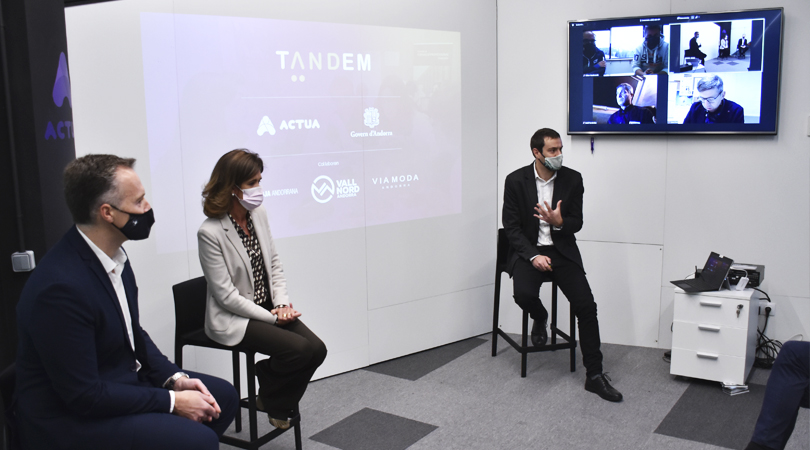The fifth edition of the Actua’s Tàndem project was presented on Tuesday, October 20th at the Andorran Innovation Space. The Tàndem’s purpose is to involve the educational community of Andorra with innovative projects being developed in companies and to promote the talent of students. This year, 80 students and 12 teachers from the Aixovall centre will be taking part, working on the challenges set by Creu Roja Andorrana (How to increase the presence of the Creu Roja in the country); Vallnord (How to reduce the ecological footprint of the ski resort); and Via Moda (How to reformulate Via Moda’s internal processes to reduce the ecological footprint).
The Education and Higher Education’s Minister, Ester Vilarrubla, highlighted “the Tàndem project allows companies to bring value to our Vocational training program and at the same time, business representatives may also learn skills and new visions from these young students, that could benefit the companies, in return “.
For his part, the Secretary of State for Economic Diversification and Innovation, Marc Galabert, emphasized that “the Tàndem’s main goal is to share talent and new ideas. The most empirical evidence is that companies from previous editions have managed to implement solutions brought by the students. This proves we have a talent base that can be used by companies and likewise, students can see an opportunity to develop their careers in these Andorran companies “.
The leader of the Actua’s Education cluster, Ferran Costa, pointed out the consolidation of the project and stressed that “we want to improve the innovative capacity of the Vocational training students and teachers to bring value to companies”.
Representatives from Creu Roja Andorrana, Vallnord and Via Moda also took part in the presentation through video Conference tools.
Previous editions
The first edition of Tàndem ended in May 2017, with three proposals presented by the Vocational training students. They came up with various solutions to the challenge posed by Perfumeria Júlia, which consisted of analysing the customer’s behaviour to improve their experiences inside the shops. The winning project consisted of an application to capture the customers information thanks to a method that combines NFC, Wifi and Bluetooth technology. Eleven students and five teachers took part of the project, involving Perfumeries Julia as the only participant company.
In the Tàndem’s second edition, the Vocational training students had to face the challenges posed by the companies: Dermandtek, on how to raise awareness to prevent skin cancer; Hotels Plaza, on how to offer a personalised gift experience to its clients; and Inlingua, on creating an attractive language immersion project during the months of July and August aimed at teenagers. Among the five finalist projects, the winner was for an application and a loyalty points system that allows the client to enjoy exclusive advantages and activities in the hotel facilities. In this edition, all the students of the Vocational Training Centre (61) participated, supervised by 11 teachers, and worked on challenges set by the three companies.
In the third edition of the Tàndem project, the Vocational training students worked on the innovation challenges posed by Andorra Telecom, Gamma Management and VallmedicVision. The winning team presented a battery of proposals to improve the sales of Andorra Telecom’s prepaid cards. 72 students participated, supervised by 12 teachers, and the challenges were as follows: Andorra Telecom, on how to innovate in the offer of prepaid mobile telephony to reach more customers; VallmedicVision, on ideas to raise awareness among the Andorran population to avoid the abuse of digital screens and reducing myopia; and Gamma Management wanted to improve the relationship of this human resources company with its customers, which are both companies and applicants.
The Tàndem’s fourth edition was attended by 68 students and 12 teachers from the Aixovall centre who worked on the challenges posed by Morabanc Andorra (How to make basketball a priority leisure option for the population between 20 and 40 years of age); Unicef (How to strengthen the collaboration of young people and Unicef); and Vatel (How to make professions in the hotel and tourism sector more attractive to the country’s students).

